4 Factors That Predict Startup Success, and One That Doesn%u2019t [Harvard Small Business]
Take a look at this page - https://www.ceoblognation.com/2016/05/4-factors-predict-startup-success-one-doesnt-harvard-small-business/ to know the 4 factors that predict startup success of your business.
Take a look at this page - https://www.ceoblognation.com/2016/05/4-factors-predict-startup-success-one-doesnt-harvard-small-business/ to know the 4 factors that predict startup success of your business.
Create successful ePaper yourself
Turn your PDF publications into a flip-book with our unique Google optimized e-Paper software.
4 <strong>Factors</strong> <strong>That</strong> <strong>Predict</strong> <strong>Startup</strong> <strong>Success</strong>, <strong>and</strong> <strong>One</strong><br />
<strong>That</strong> Doesn’t [<strong>Harvard</strong> <strong>Small</strong> <strong>Business</strong>]<br />
What makes a venture capital investment successful? Some of the most interesting data on this<br />
question comes from an analysis published last year by the venture capital firm First Round<br />
Capital. The firm’s unique data set comprises information on over 300 companies <strong>and</strong> nearly 600<br />
founders, including founder characteristics such as age, gender, education, firm location, <strong>and</strong><br />
prior work <strong>and</strong> startup experience. The study found several correlates with success — some<br />
reassuring, some surprising.<br />
First, it found that high-performing investments tend to have at least one female founder.<br />
The data also shows that younger founders <strong>and</strong> founders with prestigious educational<br />
backgrounds or prior experience in large technology companies tend to be more successful.<br />
There’s evidence that startup success is somewhat geographically diverse, not limited to Silicon<br />
Valley.<br />
Younger founding teams outperformed older ones. The research also looked at founder age,<br />
education, <strong>and</strong> experience. The average age of an entrepreneur is approximately 40, <strong>and</strong> there is<br />
reason to think that entrepreneurs improve with age.<br />
Teams with at least one founder who went to an elite school (defined by First Round as Ivy<br />
League, Stanford, or MIT) tended to perform better.<br />
In First Round’s portfolio, 38% of the companies had one founder that went to one of those<br />
schools; the study found that those companies performed about 220% better than other teams.<br />
First Round found that teams with at least one founder coming out of Amazon, Apple, Facebook,<br />
Google, Microsoft, or Twitter performed 160% better than other companies. Founding teams<br />
with experience at any of those tech companies also l<strong>and</strong>ed pre-money valuations nearly 50%<br />
larger than their peers.<br />
First Round companies started outside New York City <strong>and</strong> the San Francisco Bay Area<br />
performed just as well as those founded in traditional new-venture hubs. Twenty-five percent of<br />
the investments in the data set were outside these cities <strong>and</strong>, on average, performed slightly<br />
better than the rest.<br />
https://www.ceoblognation.com/


![4 Factors That Predict Startup Success, and One That Doesn%u2019t [Harvard Small Business]](https://img.yumpu.com/58542117/1/500x640/4-factors-that-predict-startup-success-and-one-that-doesnu2019t-harvard-small-business.jpg)

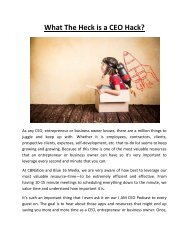
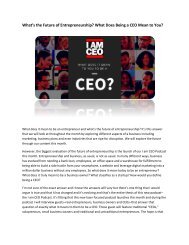
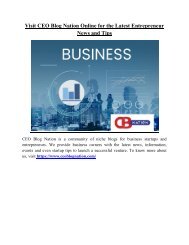



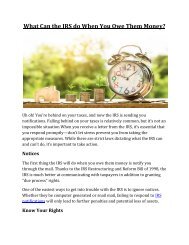
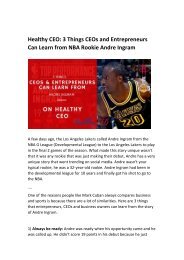

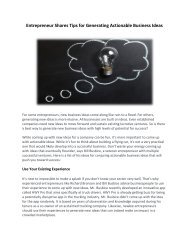

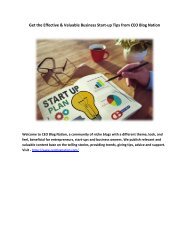
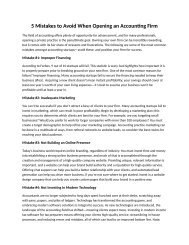

![8 Basics Every Business Needs Before a Launch [Sponsored Post]](https://img.yumpu.com/59374558/1/190x245/8-basics-every-business-needs-before-a-launch-sponsored-post.jpg?quality=85)